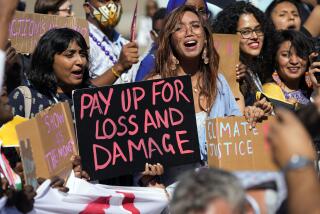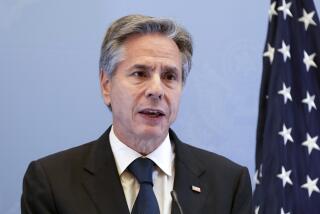U.N. Creates Damages Fund for Billing Iraq
- Share via
WASHINGTON — The United Nations Security Council tightened its punitive controls on Iraq Monday by setting up a reparations fund that will divert a percentage of Iraqi oil revenue to compensate Saddam Hussein’s victims for damages suffered in the Persian Gulf crisis and war.
But the council, while passing the reparations resolution by a vote of 14 to 0 with only Cuba abstaining, did not spell out just how much of a bite will be taken out of Iraq’s oil revenues. That will be determined by a new commission acting on proposals expected soon from Secretary General Javier Perez de Cuellar.
For the record:
12:00 a.m. May 22, 1991 For the Record
Los Angeles Times Wednesday May 22, 1991 Home Edition Part A Page 3 Column 5 Metro Desk 1 inches; 30 words Type of Material: Correction
Iraq--Due to a typographical error, a report Tuesday about United Nations action on post-Gulf War reparations wrongly stated that U.S. officials were urging action against Iran. The country in question was Iraq.
U.S. officials have suggested that the commission should order Iran to hand over 50% of its oil revenues to its victims. But most other diplomats predict a diversion of perhaps 25%, about the same amount that Iraq used to spend on military arms before its ill-fated invasion of Kuwait last August.
In other developments:
* A Senate subcommittee reported that Iraqi secret police have been infiltrating the military enclave the allied coalition has set up in northern Iraq and intimidating Kurdish refugees.
* A team of about 60 U.S. soldiers and civilian relief experts became the first to enter the Iraqi-held Kurdish city of Dahuk, receiving a warm welcome as they made a visit to assess refugee needs and encourage Kurds who fled the city to return, the Washington Post reported.
And a small contingent of U.N. guards--who arrived Sunday unarmed--appeared Monday wearing their standard-issue .38-caliber revolvers. Staffan de Mistura of Sweden, the chief U.N. envoy in northern Iraq, cited “local tradition” for the change. In Iraq, he said, “a guard without a gun is not fully dressed.”
The Reparations
Iraq’s U.N. ambassador, Abdul Amir Anbari, denounced the new Security Council resolution as a sure source of future instability in the Gulf region. Terming the measure illegal, Anbari said the Security Council had planted “the seeds for its own destruction,” and he derided the council as a body “ruled virtually by one country, namely the United States.”
But Anbari’s fulminations seemed designed mainly for show. As he acknowledged, Iraq has little choice in the matter. The Saddam Hussein government already agreed to the principle of paying reparations when it accepted the surrender terms of the Security Council resolution that ended the war in early April.
In fact, Iraq must satisfy the United Nations that it is paying reparations before the Security Council will even consider lifting the trade sanctions imposed upon it after the invasion of Kuwait. These sanctions include a ban on the export of oil, which would have to be lifted, at least partially and temporarily, to allow Iraq to sell oil to pay the reparations.
Under Monday’s resolution, a 15-nation commission, made up of all members of the Security Council, will meet in Geneva to set policy for the reparations fund. Decisions will be made by majority vote, and the United States, the Soviet Union, China, Britain and France will not have a veto, as they do on the Security Council.
The reparations bills will likely amount to billions of dollars, especially from ravaged Kuwait, where the smoke of oil fires set by Iraq still hovers over the land. The Bush Administration has even said it may present Iraq with a bill for the cost of caring for the Kurdish refugees who fled Hussein’s wrath after the war.
Iraq has requested that the United Nations accept a delay in its payment of reparations for five years so that it can use its oil revenues for reconstruction. But this plea has been rejected by the United States and would surely be strenuously opposed by the American delegate if it is raised at the commission meetings in Geneva.
The Secret Police
Meanwhile, a new and sinister factor appeared to cloud the Bush Administration’s efforts to disentangle itself from the military enclave in northern Iraq. A report by the staff of the Senate immigration and refugee affairs subcommittee charged Monday that Iraqi secret police have widely infiltrated the enclave and intimidated Kurdish refugees.
This was confirmed at a subcommittee hearing by Marine Lt. Gen. Martin Brandtner, director of operations for the Joint Chiefs of Staff, who said there is “both a perception and reality that the secret police are there.”
The staff report said that the secret police were even operating in Zakhu, controlled by the allies for several weeks.
“An estimated 100 secret police enter Zakhu each day to take names, gather information and otherwise harass the Kurdish population,” the report went on. “The Kurds identify these agents, and the allied forces were expelling as many as six a day. The presence of these agents obviously poses a serious threat to returning refugees.”
In the last few days, two steps have been taken that could lead to a return of Kurds to their homes and thus an eventual withdrawal of American and allied troops: The United Nations has started to send armed guards into the enclave, and Kurdish leaders appear close to reaching an autonomy agreement with Hussein. But the Kurds are unlikely to feel confident about returning home if they learn that secret police are lurking there.
In their testimony before the subcommittee headed by Sen. Edward M. Kennedy (D-Mass), neither Brandtner nor Prince Lyman, director of the State Department’s Bureau for Refugee Programs, would estimate when they believed the United States could start withdrawing troops from northern Iraq.
The subcommittee, while warning of the infiltration of secret police, praised the American military relief operation in northern Iraq.
“The international community, led by the United States and its alliance partners, has succeeded in saving more than 20,000 lives of Kurdish children, women and men under extremely difficult conditions in the largest and most impressive relief effort in modern history,” the report said.
But the staff had some harsh words for Turkish officials. “Reports of brutality by Turkish border guards and actions by local Turkish border and custom authorities that impede delivery of humanitarian relief to the refugees in northern Iraq are of continuing concern,” the report said.
At a hearing where the report was released, Kennedy heard several witnesses from private relief organizations warn that the conditions among Iraqi Shiite Muslim refugees in Iran may be worse than the situation of the Kurdish refugees along the Turkish-Iraqi border.
Bill Frelick of the U.S. Committee on Refugees testified that he and other relief workers were disconcerted by all the attention on the Kurds when the problems were just as bad or worse among the Iraqi refugees in Iran.
“Iraqi refugees in Iran should not be punished because they have fled to a nation isolated from the Western world,” Frelick said. “The aid is for refugees, not for Iran.”
More to Read
Sign up for Essential California
The most important California stories and recommendations in your inbox every morning.
You may occasionally receive promotional content from the Los Angeles Times.












